
Ever wondered why people buy gold bullion and hide it in their houses? It does seem suspicious. Hiding gold might have less to do with keeping it safe from thieves but keeping it safe from the government. Why would you want to hide your investment from the government? Tax. Dodging tax is never a good idea. But do you have to pay tax on your gold purchase? Gold purchases are not subject to Goods and Services Tax (GST) in Australia. You are only required to pay GST on freight and on insurance.
The government doesn’t necessarily require you to report our gold purchases, however, if you pay over $5,000 AUD cash for your gold bullion there are regulations you have to abide by. Gold bullion dealers will require customer identification. This is in line with The Australian Anti-Money Laundering and Counter-Terrorism Financing Act of 2006. Mints and gold bullion dealers are required by law to request the customer to provide some form of government-issued ID and to keep a certified and notarized copy of this on file. This has less to do with the government being strict on gold purchases but this is in line with most cash transactions that go above a certain threshold over a certain period of time. According to the Australian Tax Office (ATO), you don’t have to pay any GST for investment grade gold which is essentially Gold bullion products with 99.5% purity or more. Investment grade gold bullion also needs to be tradable on the international market as a coin, a bar, a tablet or a wafer. It should also carry the stamp or mark from the manufacturer that specifies weight, purity and quality.
Why are these restrictions necessary?
Gold has immense value as a form of private currency. It is easy to avoid government control on gold transactions because in truth, no government actually controls gold, hence the inclusion of this precious metal in the Anti-Money Laundering and Counter-Terrorism Financing Act. The precious metal market and the market for gold bullion in particular are big and easy to manipulate. You can buy gold bullion coins like Krugerrands, Australian Kangaroos, Canadian Gold Maple leaf coins or an American eagle coins remain the same from the time you buy it until the time you decide to sell. Gold does not tarnish, it does not decompose and it is easy to store or hide. Gold is very liquid and every country has a number of gold dealers willing to pay top dollar for gold bullion coins in mint condition. It is unfortunate that criminals find this precious commodity an ideal way to move illicitly gained money.
What about Tax when you sell gold Bullion?
According to Australian law, you only pay GST on investment grade gold bullion if the value is greater at the time of sale than at the time of purchase.
How about other gold products?
Gold Coins
GST exemption applies when the product carried the character of the metal itself and not that of the product that the metal was used to make. This excludes a lot of bullion coins because their purity already puts them in the right category.
Collectible coins or numismatic coins o the other hand are not investment grade gold, they may actually attract some GST.
Gold jewellery
Gold is an attractive metal, it also attracts GST.
The Bottom line to this is that, you should educate yourself about the tax requirement when it comes to gold and the legal requirements you need to meet when buying or selling this precious metal so that you are always on the right side of the law





